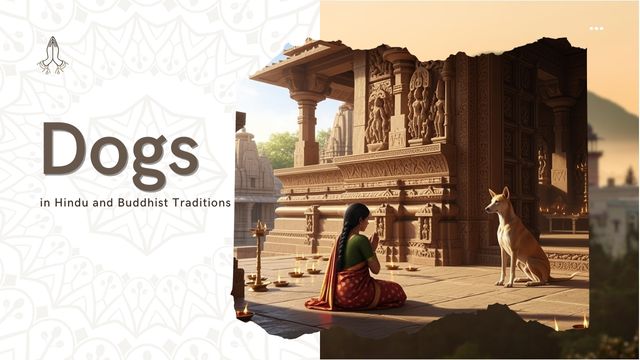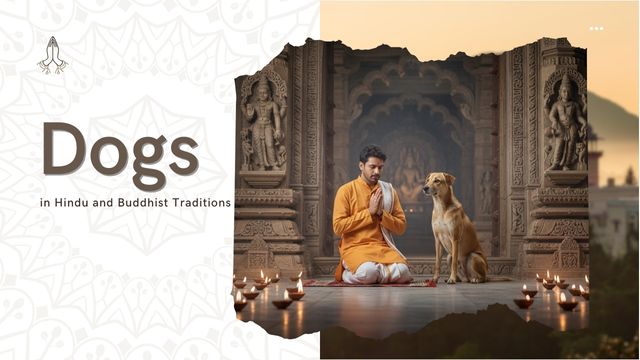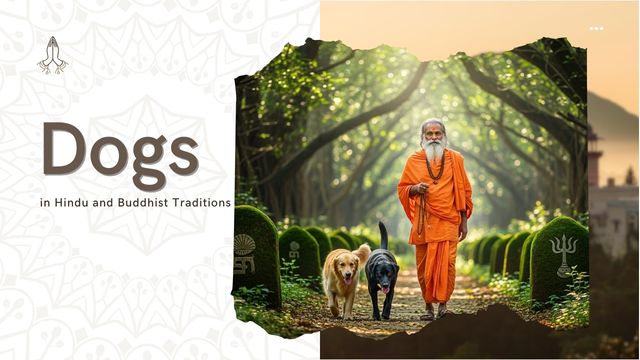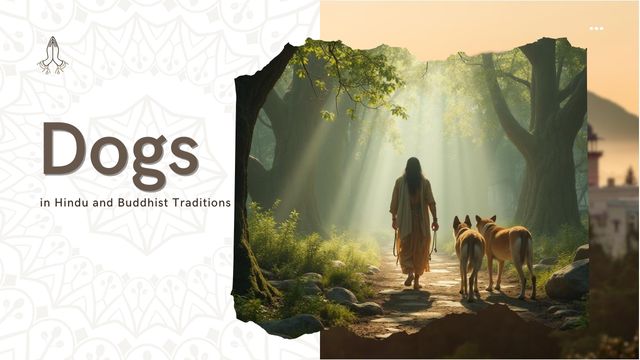Dogs have played sacred roles in Hindu and Buddhist traditions for thousands of years, serving as divine messengers, loyal protectors, and spiritual guides. These ancient Eastern religions view dogs not just as animals, but as powerful symbols of devotion, faithfulness, and the connection between earthly and spiritual realms.
In Hindu mythology, dogs appear alongside gods like Bhairava and serve as guardians of sacred spaces. Buddhist teachings honor dogs as examples of pure loyalty and unconditional love. Both traditions teach us that dogs carry special spiritual energy that can guide humans toward enlightenment and protection.
Understanding these deep spiritual connections helps us see why dogs appear so frequently in our lives and dreams. Their presence often signals important spiritual messages that we need to pay attention to in our daily journey.
Key Takeaways: Dogs in Hindu and Buddhist Spirituality FAQ
Q: What do dogs represent in Hindu traditions? A: Hindu mythology views dogs as sacred guardians, divine messengers, and symbols of loyalty that protect devotees and guide souls between worlds.
Q: How do Buddhists view dogs spiritually? A: Buddhist teachings see dogs as examples of unconditional love, faithful companionship, and living beings deserving compassion and respect on their spiritual journey.
Q: Why are dogs considered spiritual protectors in Eastern religions? A: Both Hindu and Buddhist traditions believe dogs possess natural intuition to sense negative energy and protect their human companions from spiritual harm.
Q: What does it mean when dogs appear in Hindu or Buddhist dreams? A: Dream dogs in these traditions often represent divine guidance, upcoming protection, or messages from spiritual guardians trying to communicate important life changes.
Q: How do these traditions view the bond between humans and dogs? A: Eastern religions teach that the human-dog bond reflects sacred relationships based on mutual devotion, trust, and spiritual growth through companionship.
Q: What spiritual lessons do dogs teach in Hindu and Buddhist philosophy? A: Dogs demonstrate unconditional love, present-moment awareness, forgiveness, and the importance of serving others without expecting rewards in return.
Q: Are there specific dog breeds mentioned in Hindu or Buddhist texts? A: While ancient texts don’t specify modern breeds, they describe dogs with qualities that match protective breeds like German Shepherds and loyal companions.
Topics in Discussion
How Do Dogs Appear in Hindu Sacred Texts and Mythology?
Hindu sacred texts like the Mahabharata and various Puranas feature dogs as loyal companions who demonstrate unwavering devotion and spiritual wisdom.
The most famous dog story comes from the Mahabharata, where Yudhishthira’s faithful dog accompanies him on his final journey to heaven. When the gods test Yudhishthira by asking him to abandon his dog to enter paradise, he refuses. This act of loyalty and compassion reveals that the dog was actually Dharma (righteousness) in disguise, teaching us that true spirituality means never abandoning those who depend on us.
In Hindu mythology, Lord Bhairava (a fierce form of Shiva) is often depicted with a dog as his vehicle or companion. This connection shows dogs as guardians of sacred knowledge and protectors of divine energy. The dog represents the devotee’s faithful service to the divine.
Dattatreya, another important Hindu deity, is frequently shown with four dogs representing the four Vedas (sacred texts). These dogs symbolize different aspects of spiritual knowledge and the importance of learning from all sources of wisdom.
Dogs in Hindu Scriptures
Q: What does Yudhishthira’s dog teach us spiritually? A: The story shows that true spiritual advancement comes from treating all beings with compassion, regardless of their form or social status.
Q: Why is Lord Bhairava associated with dogs? A: Dogs represent fierce loyalty and protective instincts, matching Bhairava’s role as a guardian deity who protects devotees from negative forces.
Q: What do the four dogs with Dattatreya represent? A: Each dog symbolizes one of the four Vedas, teaching us that spiritual wisdom comes from multiple sources and loyal study.

What Role Do Dogs Play in Buddhist Teachings and Stories?
Buddhist philosophy emphasizes compassion for all sentient beings, with dogs serving as perfect examples of unconditional love and present-moment awareness.
Buddha himself taught that all animals, including dogs, possess Buddha nature – the potential for enlightenment. This means dogs are not just pets but fellow travelers on the spiritual path who can teach humans important lessons about love, forgiveness, and living in the moment.
One famous Buddhist story tells of a dog who showed such devotion to its master that even after death, it continued to guard his meditation spot. This story illustrates how pure love transcends physical existence and becomes a spiritual force that continues beyond death.
Tibetan Buddhism particularly honors dogs as protective spirits. Many Tibetan monasteries keep dogs not just for companionship but as spiritual guardians who can sense negative energies and protect the sacred spaces from harm.
The Jataka Tales (stories of Buddha’s previous lives) include several stories where Buddha appears as various animals, including dogs, teaching lessons about sacrifice, loyalty, and serving others without expecting rewards.
Dogs in Buddhist Practice
Q: How do Buddhists view feeding stray dogs spiritually? A: Feeding stray dogs creates positive karma by showing compassion to vulnerable beings and practicing generosity without expecting anything in return.
Q: Can dogs achieve enlightenment in Buddhist belief? A: Buddhist teachings suggest that all beings with consciousness can eventually reach enlightenment, including dogs through their pure hearts and loving nature.
Q: Why do Tibetan monasteries keep dogs? A: These dogs serve as both companions and spiritual protectors, using their natural intuition to guard sacred spaces from negative energies.

Why Are Dogs Considered Divine Messengers in Eastern Spirituality?
Both Hindu and Buddhist traditions teach that dogs possess special sensitivity to spiritual energies that humans often miss.
Dogs can sense the presence of spirits, negative energies, and divine beings before humans notice them. This natural ability makes them perfect messengers between the physical and spiritual worlds. When dogs behave unusually – like barking at empty spaces or staring intensely at certain areas – these traditions suggest they’re responding to spiritual activity.
In Hindu belief, dogs can carry messages from deceased family members or divine beings trying to communicate with the living. Their loyal nature makes them trusted messengers who won’t distort or ignore important spiritual communications.
Buddhist teachings emphasize that dogs demonstrate perfect mindfulness – they live completely in the present moment without worrying about the past or future. This quality makes them ideal teachers for humans seeking to develop better meditation and awareness practices.
Many Eastern spiritual teachers observe that dogs naturally practice unconditional love, forgiveness, and service to others – the exact qualities humans need to develop for spiritual growth.
| Spiritual Quality | How Dogs Demonstrate It | Human Lesson |
|---|---|---|
| Unconditional Love | Love their families regardless of treatment | Practice loving without conditions |
| Present Moment Awareness | Focus completely on current experience | Develop mindfulness and meditation |
| Forgiveness | Quickly forgive and forget conflicts | Release grudges and practice mercy |
| Loyalty | Remain faithful through all circumstances | Develop devotion and commitment |
| Service | Naturally help and protect their families | Serve others without expecting rewards |
Dogs as Spiritual Messengers
Q: How can you tell when a dog is delivering a spiritual message? A: Watch for unusual behaviors like persistent staring, unexplained barking, or sudden changes in energy around specific people or places.
Q: What should you do when you sense your dog is responding to spiritual activity? A: Pay attention to what they’re reacting to, offer prayers for protection, and consider what message the universe might be sending through them.

How Do Hindu and Buddhist Traditions View Dog Dreams?
Dreams about dogs carry deep spiritual significance in both Hindu and Buddhist interpretations, often representing divine protection and spiritual guidance.
Dreaming of dogs in Hindu tradition usually indicates that protective energies surround you. A friendly dog in dreams suggests that dharma (righteous living) guides your path, while a protective dog warns you about upcoming challenges that require spiritual strength.
Buddhist dream interpretation sees dogs as symbols of the faithful mind that seeks truth and enlightenment. Dreams where dogs guide or protect you suggest that your Buddha nature is awakening and leading you toward spiritual growth.
Different dog actions in dreams carry specific meanings:
- A dog licking you represents purification and spiritual cleansing
- Dogs barking in dreams often warn about spiritual dangers or negative influences you need to address
- Puppies in dreams symbolize new spiritual beginnings and fresh opportunities for growth
- Dead dogs in dreams indicate the end of one spiritual phase and preparation for the next level of understanding
Dog Dreams in Eastern Traditions
Q: What does dreaming of a white dog mean in Hindu and Buddhist beliefs? A: White dogs represent pure spiritual energy, divine blessings, and protection from higher realms watching over your spiritual journey.
Q: Are aggressive dog dreams always negative in these traditions? A: Not always – sometimes aggressive dogs in dreams represent your inner spiritual warrior fighting against negative influences or bad habits.
Q: How do you interpret dreams where dogs are speaking? A: Speaking dogs in dreams suggest direct divine communication, with the words carrying important spiritual guidance for your current life situation.

What Spiritual Protection Do Dogs Offer According to Eastern Beliefs?
Hindu and Buddhist traditions teach that dogs naturally create protective energy fields around their families through their pure intentions and loyal hearts.
Dogs can sense and ward off negative spiritual influences that humans cannot perceive. Their presence alone creates a barrier against harmful energies, evil spirits, and psychic attacks. This protection extends beyond the physical realm into spiritual dimensions.
In Hindu households, dogs are often considered as effective as sacred mantras for protection. Their constant vigilance and natural alertness help guard against both physical and spiritual threats. Many Hindu families believe that mistreating a dog brings negative karma, while caring for dogs increases positive spiritual energy in the home.
Buddhist teaching emphasizes that dogs protect through their compassionate presence. Their unconditional love creates positive energy that naturally repels negative forces. Monasteries often keep dogs not just for companionship but as living protectors who maintain the spiritual purity of sacred spaces.
Both traditions recognize that when stray dogs choose you, it often signals that you need extra spiritual protection during a vulnerable time in your life.
Spiritual Protection from Dogs
Q: How do dogs protect against negative energy spiritually? A: Dogs create protective energy through their pure hearts, loyal intentions, and natural ability to sense and repel harmful spiritual influences.
Q: Can dogs protect their owners from curses or evil eye? A: Eastern traditions believe dogs can absorb and neutralize negative energy directed at their families, including jealousy and ill-wishes from others.
Q: What happens spiritually when someone harms a dog? A: Both traditions teach that harming innocent beings like dogs creates heavy negative karma that returns to the person through various life difficulties.

How Can Modern Dog Owners Apply These Ancient Spiritual Teachings?
Modern dog ownership becomes more meaningful when we understand these ancient Hindu and Buddhist spiritual principles and apply them to our daily relationships with our canine companions.
Start by recognizing your dog as a spiritual teacher rather than just a pet. Watch how they demonstrate unconditional love, forgiveness, and present-moment awareness. These qualities are exactly what spiritual practices like meditation and yoga try to develop in humans.
Create daily spiritual practices that include your dog:
- Meditate with your dog nearby to learn from their natural mindfulness
- Practice gratitude for their loyal companionship and protective presence
- Observe their behavior for spiritual messages about your home’s energy
- Use walks as moving meditation time to connect with nature and your spiritual path
Both traditions emphasize karma – the spiritual law that good actions create positive results. Caring for dogs, feeding strays, and treating all animals with respect generates positive spiritual energy that improves your life path.
Consider your dog’s spiritual signs as guidance for important life decisions. When they’re restless, protective, or unusually affectionate, pay attention to what might be happening in your spiritual journey.
Applying Ancient Dog Wisdom Today
Q: How can busy people incorporate dog spirituality into daily life? A: Use dog walking time for meditation, practice gratitude while feeding them, and observe their behavior for spiritual insights about your home’s energy.
Q: What’s the spiritual benefit of rescuing dogs according to these traditions? A: Rescuing dogs creates powerful positive karma by saving a sentient being, which brings blessings and protection into your spiritual journey.
Q: How do you honor a dog’s death using Hindu and Buddhist principles? A: Honor their spiritual contribution through gratitude ceremonies, charitable acts in their memory, and recognizing their role as spiritual teachers in your life.
What Do Different Dog Colors Mean in Hindu and Buddhist Symbolism?
Color symbolism plays an important role in both Hindu and Buddhist spiritual traditions, with different colored dogs carrying specific spiritual meanings and messages.
Black dogs in Eastern traditions represent protection from evil, absorption of negative energy, and connection to divine feminine energy. Unlike Western superstitions, black dogs in Hindu and Buddhist belief are highly positive symbols of spiritual guardianship.
White dogs symbolize purity, divine blessings, and spiritual enlightenment. They represent the highest spiritual qualities and often appear to people ready for significant spiritual advancement.
Brown dogs connect to earth energy, grounding, and practical spiritual wisdom. Brown dogs help people stay balanced while pursuing spiritual growth.
Golden dogs represent prosperity, divine favor, and spiritual abundance. Golden colored dogs often appear to signal incoming blessings and positive life changes.
Grey dogs symbolize wisdom, balance between opposites, and spiritual neutrality. Grey dogs help people navigate complex spiritual decisions with clarity.
| Dog Color | Hindu Meaning | Buddhist Meaning | Spiritual Message |
|---|---|---|---|
| Black | Divine Protection | Absorption of Suffering | Guard against negativity |
| White | Purity & Enlightenment | Buddha Nature | Spiritual advancement |
| Brown | Earth Connection | Grounded Wisdom | Stay practical in growth |
| Golden | Divine Blessings | Prosperity Dharma | Abundance approaching |
| Grey | Balanced Wisdom | Middle Path | Find spiritual balance |
Dog Color Spirituality
Q: Does a dog’s breed matter as much as color in spiritual meaning? A: Color carries universal spiritual energy, while breed characteristics like German Shepherd loyalty or Husky independence add specific spiritual qualities to consider.
Q: What if your dog has multiple colors spiritually? A: Multi-colored dogs combine different spiritual energies, offering balanced protection and guidance across various life areas.
Q: Do these color meanings apply to dogs you see in meditation or visions? A: Yes, dogs appearing during spiritual practices carry the same color symbolism and often represent messages from higher spiritual realms.
Additional Resources and Related Topics
Understanding dogs in Hindu and Buddhist traditions opens doors to deeper spiritual connections with our canine companions. These ancient teachings remind us that dogs are not just pets but spiritual teachers, protectors, and messengers who enrich our spiritual journey.
Whether you’re experiencing spiritual signs from dogs, trying to understand what your dog’s behavior means spiritually, or wondering about the deeper meaning when dogs appear repeatedly in your life, these Eastern spiritual traditions offer profound wisdom for modern dog lovers.
The bond between humans and dogs reflects sacred relationships built on mutual devotion, trust, and spiritual growth. By honoring these ancient teachings, we can deepen our connection with our canine companions and learn valuable lessons about love, loyalty, and living with spiritual awareness.
References:
Dattatreya, Bhairava, Hindu and Buddhist Symbolism:
How Dogs Have Shaped History and Culture – Aliens Tattoo
https://www.alienstattoo.com/post/how-dogs-have-shaped-history-and-culture
Dog-Goddess, Divine Nature, Traditions:
International Journal of Advance Study and Research Work (2581-5997)/ Volume 2/Issue 9/September 2019
https://www.ijasrw.com/pdf/Finalorg/2019/5_Sep19.pdf
Indra and Sarama, Yudhishthira, Spiritual Messenger:
The Divine Bond: Humans, Dogs, and Spirituality – Shukrana
https://www.shukrana.com/the-divine-bond-humans-dogs-and-spirituality
Bhairava, Sarama, Sacred Animal Status:
Darling Dogs and Covetous Cats: Sacred Animals in Hinduism
https://www.pdinsurance.co.nz/blogs/sacred-animals-in-hinduism/
Protector, Guardian, Spiritual Guide:
DOG SYMBOLISM IN DREAMS: companions, protectors and guides …
https://thisjungianlife.com/dog-symbolism-in-dreams/
Comparative Religion, Mythology Gatekeepers, Yama:
Dogs in religion – Wikipedia
https://en.wikipedia.org/wiki/Dogs_in_religion
Dattatreya, Tihar Festival, Messengers:
Dogs and Diwali? 5 things to know about Hinduism and hu(man’s …
https://www.hinduamerican.org/blog/dogs-and-diwali-5-things-to-know-about-hinduism-and-humans-best-friend
Ithamar Theodor’s Academic Overview:
Dogs in Hindu, Indian, and Asian Traditions (Ithamar Theodor, Fall 2011)
https://sites.arizona.edu/sari/project/dogs-in-hindu-indian-and-asian-traditions-ithamar-theodor-fall-2011/
Loyalty, Protection, Spiritual Bond:
Dogs in Hinduism and Buddhism – Depthdogguide
https://depthdogguide.com/dog-history/dogs-in-hinduism-and-buddhism/
Ancient Indian Historical Lens:
Gone to the Dogs in ancient India – FID4SA-Repository
https://fid4sa-repository.ub.uni-heidelberg.de/4243/3/Bollee_GttD_Gesamt.pdf
Great Job Aoife O’Sullivan & the Team @ Spavelous Source link for sharing this story.



